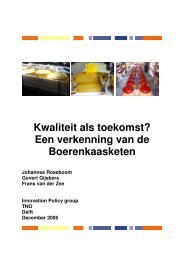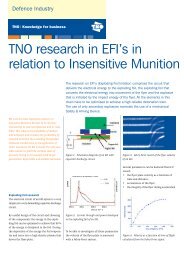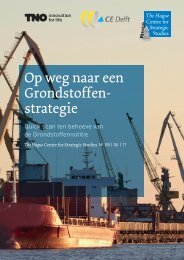Argument Map - TNO
Argument Map - TNO
Argument Map - TNO
You also want an ePaper? Increase the reach of your titles
YUMPU automatically turns print PDFs into web optimized ePapers that Google loves.
SHALE GAS<br />
ARGUMENTs<br />
MAPped<br />
WHAT IS AN ARGUMENT MAP?<br />
An <strong>Argument</strong> <strong>Map</strong> summarises and clarifies all relevant<br />
arguments, both for and against, concerning a complex<br />
(public) issue. The arguments on the map are gathered<br />
by interviewing about thirty different experts, mainly in<br />
so called thinking sessions. Using a careful selection<br />
of experts and a strict interviewing methodology, the<br />
<strong>Argument</strong>ation Factory guarantees a comprehensive<br />
and objective overview of arguments.<br />
About <strong>TNO</strong><br />
This map is an initiative of <strong>TNO</strong>, an<br />
independent research organisation, based<br />
in the Netherlands. <strong>TNO</strong> connects people<br />
and knowledge to create innovations that<br />
boost the sustainable competitive strength<br />
of industry and well-being of society.<br />
To secure a gradual transition towards<br />
sustainable energy, <strong>TNO</strong> invests in<br />
environmental alternatives and stimulates<br />
optimal and clean use of fossil fuels during<br />
this transition.<br />
CONTACT<br />
René Peters<br />
Director Gas Technology<br />
T +31 88 866 63 40<br />
E rene.peters@tno.nl<br />
What are<br />
the arguments for<br />
and against production<br />
of shale gas for EU<br />
member states<br />
with shale gas<br />
resources?<br />
www.argumentenfabriek.nl/about-argumentation-factory<br />
<strong>TNO</strong>.NL/SHALEGAS<br />
This <strong>Argument</strong> <strong>Map</strong> aims<br />
to facilitate the discussion<br />
about shale gas production<br />
in Europe. The <strong>Map</strong> takes<br />
no position on the issues<br />
and provides no advice:<br />
weighing the arguments<br />
is left to the reader<br />
JRV070213-02
ArgUmEnt mAp ShAlE gAS prodUction in EU mEmbEr StAtES<br />
Shale gas production contributes to the country’s energy supply<br />
Shale gas production helps to satisfy the growing demand for energy.<br />
Shale gas can reduce gas imports or substitute (declining) conventional gas production.<br />
Shale gas can support other forms of energy production<br />
Shale gas can provide energy when renewable energy sources fail to meet peak demand.<br />
Shale gas production generates knowledge for use in other forms of energy production (e.g. geothermal).<br />
Shale gas production and use are relatively environmentally friendly<br />
Shale gas combustion generates less greenhouse gas per unit of energy than coal and oil.<br />
Technologies for reducing the environmental impact of shale gas production are available and improving.<br />
Domestic shale gas production reduces long-distance transport of imported energy.<br />
Domestic shale gas production increases control over environmental impact of energy production<br />
High environmental standards for shale gas production in the EU can lead to better standards worldwide.<br />
Domestic shale gas production may have less environmental impact than energy production elsewhere.<br />
Shale gas can be produced safely<br />
Shale gas production uses common technologies, which limits safety risks.<br />
Shale gas production can lead to additional investments in the maintenance of the gas infrastructure.<br />
Shale gas production can be monitored real time and adjusted if necessary, which limits safety risks.<br />
Shale gas production is financially profitable for the country<br />
The state benefits from the sale of shale gas, as shareholder, receiver of royalties or through taxes.<br />
Use of the existing gas transport network will be extended so public investments are more profitable.<br />
Shale gas production can lower gas and energy prices and increase people’s purchasing power.<br />
Shale gas production strengthens the national economy<br />
Shale gas production decreases energy imports and thus improves a country’s balance of payments.<br />
The country can export knowledge and experience of shale gas production.<br />
Lower energy prices due to shale gas production improve the competitiveness of energy intensive industries.<br />
Shale gas gives the country more options for the distribution of gas, which can be profitable.<br />
Shale gas production can attract foreign investors.<br />
Shale gas production boosts the local economy<br />
Shale gas production offers business opportunities to local companies close to the production area.<br />
Shale gas production increases regional employment.<br />
Infrastructure built to produce shale gas remains beneficial to the local community after production stops.<br />
Shale gas production strengthens the political position of the country<br />
Shale gas production strengthens the international negotiation power of the country.<br />
Shale gas production reduces the dependence on gas supply from gas exporting countries.<br />
Shale gas production strengthens the sense of independence and autonomy of citizens.<br />
Energy<br />
Environment<br />
Environment<br />
Safety<br />
Economy<br />
Politics<br />
What is shale gas?<br />
Shale gas is natural gas that is<br />
“locked” in clay layers (shales) in the<br />
subsurface. Shale gas is produced<br />
using the technique of hydraulic<br />
fracturing, or ‘fracking’, to create<br />
fractures in the shales that allow the<br />
gas to flow out. Shale gas production<br />
requires more water, chemicals and<br />
more wells to be drilled compared to<br />
conventional gas production. Shale<br />
gas can be used in the same way as<br />
conventional gas without any<br />
modifications to existing gas<br />
infrastructure. Exploratory drilling is<br />
needed to assess how much gas is<br />
present and whether it can be<br />
profitably produced. The EU does<br />
currently not take a position that<br />
either hinders or promotes<br />
shale gas production.<br />
What are<br />
the arguments for<br />
and against production<br />
of shale gas for EU<br />
member states<br />
with shale gas<br />
resources?<br />
For<br />
Against<br />
This <strong>Argument</strong> <strong>Map</strong> summarises<br />
the arguments for and against<br />
shale gas production for<br />
EU member states with<br />
shale gas resources.<br />
The arguments for and against<br />
exploratory drilling, other than as<br />
an initial step in the production<br />
proces s, are not given<br />
consideratio n here. This map is<br />
based on literature study and<br />
input from experts from different<br />
backgrounds and member states.<br />
We thank all participants for<br />
their contribution.<br />
Energy<br />
Safety<br />
Economy<br />
Politics<br />
Shale gas production hinders the transition to renewable energy<br />
Government investments in shale gas production cannot be spent on renewable energy.<br />
Shale gas production increases the energy supply and thus delays the urgency to switch to renewable energy.<br />
Shale gas production reduces fossil energy prices making renewable energy relatively expensive.<br />
Shale gas production harms the environment<br />
Shale gas production and post-production wells can lead to groundwater contamination.<br />
Shale gas production requires water and thus competes with other demands for water.<br />
Shale gas production can lead to methane emissions and thus add to the greenhouse effect.<br />
Shale gas production negatively impacts air quality during well construction and production of gas.<br />
Shale gas production uses chemicals which may harm the environment.<br />
Shale gas production restricts space and disturbs tranquillity<br />
Shale gas production requires wells to be drilled, which are blots on the landscape and require space.<br />
Shale gas production requires transport and drilling, which affect the environment and hinder residents.<br />
Shale gas production is a hazard to employees and residents<br />
Shale gas production poses a risk of earth tremors and reactivation of faults.<br />
Harmful substances in the shale layer, like radioactive materials, may come to the surface.<br />
Shale gas production has safety risks, while little is known about effective measures to address accidents.<br />
The use of common technologies in unconventional conditions can lead to unpredictable outcomes.<br />
Shale gas production is expensive and its profitability is unclear<br />
Exploratory drilling costs the taxpayer money in countries where the state will co-invest in exploration.<br />
It is unclear how much gas can be profitably produced and whether public investments are worth making.<br />
Developing and implementing governmental supervision comes at the taxpayer’s expense.<br />
Shale gas production may lower the value of property<br />
House prices may fall in the vicinity of production wells.<br />
Large scale shale gas production may weaken the national economy in the long term<br />
Sale of shale gas may weaken the country’s competitiveness through the rising value of its national currency.<br />
Shale gas production can lead to domestic political tensions<br />
Part of the public resists shale gas production and this can cause political upheaval.<br />
Information about shale gas production is diverse and misty, therefore citizens cannot assess its impact.<br />
Shale gas production requires amendments to existing law and legislation<br />
A country’s regulatory framework may not be able to cover all aspects of shale gas production.<br />
Governmental supervision is inadequately geared to the specific technology of shale gas production.<br />
Shale gas production can create international tensions<br />
Shale gas production may negatively influence the environment and safety in neighbouring countries.<br />
commissioned by: made by: The <strong>Argument</strong>ation Factory<br />
2012
















